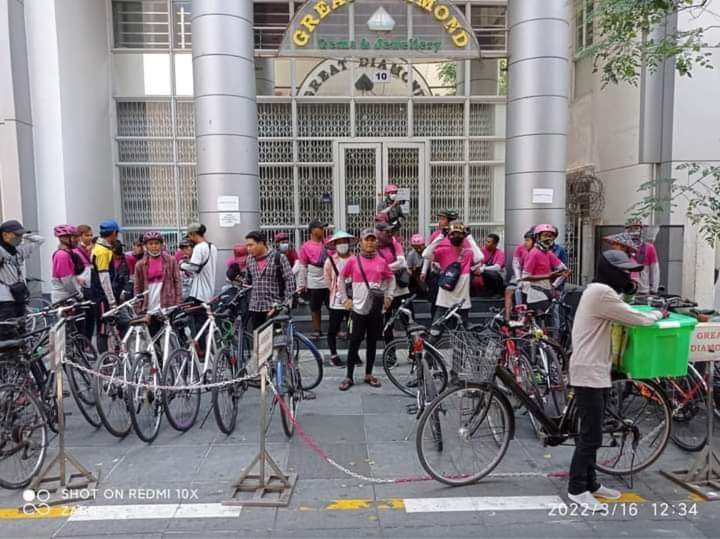Couriers from Foodpanda continued striking yesterday after the German on-demand delivery service slashed pay rates by more than half. Those participating in the protests — held in major cities across Burma — said they would return to work when previous pay levels were reinstated.
Riders complained they now stand to receive K200-300 (US 10-15 cents) per kilometer cycled, down from pre-coup rates of K600-700. Over the same period, the kyat has lost around one third of its value, further impacting previous wages.
Netizens called on those using Foodpanda to adequately tip riders, some of whom have previously complained of dangerous working conditions.
A manager of a food and beverage shop in Yangon told DVB that some of the restaurants are also participating in the rider strike to support the riders by stopping their participation on Foodpanda’s app.
“Our shop didn’t run the Foodpanda application starting today, on March 18, and some other restaurants stopped using the app yesterday. We wanted to support them because we don’t like taking advantage of the riders,” she said.
According to the Foodpanda Yangon Rider Group on Facebook, riders say rates recently fell to K200-400 per order, less than half of previous earnings of between K900-1100.
A manager said that restaurant owners needed to pay 30 percent of the value of each food order directly to Foodpanda, and that some of those selling on the app had found it difficult to increase online rates, thereby absorbing the cost themselves.
“Our shop is a franchise branch of an international brand, so we have to make the same price at the restaurant and online. The online order system already gives 30 percent of our sales price to Foodpanda – so we don’t like them taking advantage of the riders,” she said, adding that her shop will not use the Foodpanda application until the issue is resolved.
Drivers and restaurants reported not being able to file their complaints with Foodpanda during this time, adding that communication was only possible if the company chose to contact them. Customers reported similar issues with making complaints.
The company announced on March 18 that it had begun hiring new riders. In response to the protests, Foodpanda issued a statement attributing the March 16 wage slash to a “system error” that had occurred between 7:00 and 7:30 a.m. The company also announced on March 18 that it had begun hiring new riders.
“This resulted in a miscalculation of rider fees, reflecting a MMK 200 fee during the 30-minute glitch. This was resolved quickly and rider fees were restored back to the normal rates. Rest assured that any deduction as a result of this incident will be corrected and reimbursed,” the statement read.
Foodpanda added that it was working was considering an increase in rider wages and the provision of additional funding for petrol in face of rampant fuel and commodity price inflation within Burma. The company also reaffirmed its commitment to remaining in the country.
Despite Foodpanda’s claims that it had resolved its pay issue “glitch”, rider protests continued well into Monday. The BBC reported that dozens of the company’s pink vested cyclists had gathered in Yangon and were later questioned by security forces.
One rider, who has worked for Foodpanda since the company’s entry to Burma two years ago, said that he has not returned to work since March 18, and that the company has yet to fully address riders’ concerns.
“They announced that they had negotiated with riders, but the negotiation was conducted by only ten riders — and we don’t know who they are,” he told DVB. “The ten riders are not veterans of the service, and we don’t know how they negotiated. That’s why I haven’t gone back to work yet.”
Whilst touting the German company as previously being a “great company” to work for, he mused that typical earnings per ride now stand somewhere between K500-900 — a fall from highs of K1,000-1,500 (a number not adjusted to take into account the declining real value of the kyat).
Foodpanda stated in its press release that an average rider typically brings home around K300,000 (US$150) a month, with top earners making up to K600,000 (USD300).
“While we assure you that we are in constant communications to hear rider feedback and complaints, it is also critical for us to ensure the safety of all riders who simply want to do their jobs to earn money for their families,” the company’s statement read. “Foodpanda still holds the belief we’re doing the right thing by staying firm to our commitment here, and we hope to continue being part of Myanmar people’s lives for a long time.”



